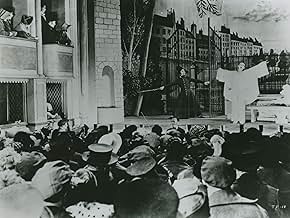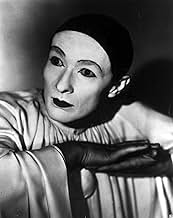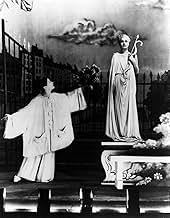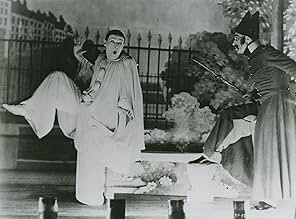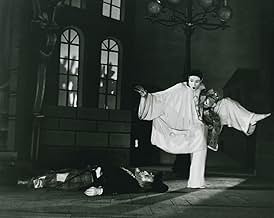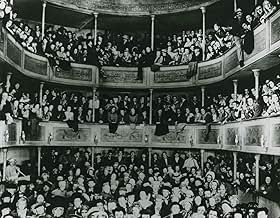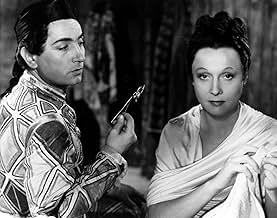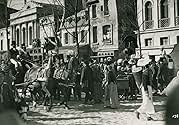AVALIAÇÃO DA IMDb
8,3/10
22 mil
SUA AVALIAÇÃO
A vida teatral de uma bela cortesã e dos quatro homens que a amam.A vida teatral de uma bela cortesã e dos quatro homens que a amam.A vida teatral de uma bela cortesã e dos quatro homens que a amam.
- Indicado a 1 Oscar
- 2 vitórias e 1 indicação no total
María Casares
- Nathalie
- (as Maria Casarès)
Palau
- Le régisseur des Funambules
- (as Pierre Palau)
Etienne Decroux
- Anselme Debureau
- (as Étienne Decroux)
Jane Marken
- Mme Hermine
- (as Jeanne Marken)
Raymond Rognoni
- Le directeur du Grand Théâtre
- (as Rognoni)
Avaliações em destaque
One day in 1966 I was walking along 8th Street in the Village. The Village was where I went when I had no where else to go, when I belonged no where, where I thought I could discover myself. It didn't hurt that there were people to stare at, without being too obvious about it.
It was a gray day and it started to rain. I stopped under the first protection I found, a movie marque - neither handsome nor attractive.
The photos promoting the film were behind glass at odd angles, held by tacks. I just wasn't in the mood. It wasn't what I was looking for. But the rain got worse, and I needed warmth. So I bought my ticket to join the twenty or so people who comprised the full audience.
From its first moment, the film pulled me in. After a frenetic start, it quieted to Jean-Louis Barrault sitting alone on a barrel. I'd seen Marceau before, but not until now had I seen the quiet poetry of true mime.
Barrault's character, Baptiste, had silently observed the theft of a watch. Baptiste pantomimed the theft but staged his pantomime as if people's perceptions were a mistake, as if the theft never took place. In the doing, he made everyone laugh. He did this for the love of Garance, played by Arletty, whom he had seen for the first time.
There follows in the film first love - unrequited, poetic, soulful. We see villainy, melodrama, danger, heroism, satire, plays within plays - a host of stories all integral to the whole of the play. And we believe completely.
It is the most complete film ever made. It changed my life.
It was a gray day and it started to rain. I stopped under the first protection I found, a movie marque - neither handsome nor attractive.
The photos promoting the film were behind glass at odd angles, held by tacks. I just wasn't in the mood. It wasn't what I was looking for. But the rain got worse, and I needed warmth. So I bought my ticket to join the twenty or so people who comprised the full audience.
From its first moment, the film pulled me in. After a frenetic start, it quieted to Jean-Louis Barrault sitting alone on a barrel. I'd seen Marceau before, but not until now had I seen the quiet poetry of true mime.
Barrault's character, Baptiste, had silently observed the theft of a watch. Baptiste pantomimed the theft but staged his pantomime as if people's perceptions were a mistake, as if the theft never took place. In the doing, he made everyone laugh. He did this for the love of Garance, played by Arletty, whom he had seen for the first time.
There follows in the film first love - unrequited, poetic, soulful. We see villainy, melodrama, danger, heroism, satire, plays within plays - a host of stories all integral to the whole of the play. And we believe completely.
It is the most complete film ever made. It changed my life.
It is an epic. One of the best films ever made. The script and the dialogues show that the genius of Jacques Prévert wasn't made only for written poetry but for poetry in motion as well.Carné's camera is precise and makes one feel like a real witness of the plot. All in all a lesson of how to make a film yesterday, today and tomorrow.
it takes a real poet to write dialog this incisive, not that i speak french, but the new subtitles are very clear (visually) and concise (linguistically)... the poet was jacques prevert, the director marcel carne, and if you want to know how powerful real moviemaking can be, you have to see this picture... as in all true tragedy, the various pairs of lovers comment by their actions on each other's destinies... baptiste/garance are the main pair we care most about, but all the others contribute to and contrast with their true, genuine, doomed affair... the shadows of the main pair are baptiste/nathalie, and garance/frederick, descending to the sick depths of garance/edouard, lacenaire/avril, and jericho/himself. it's like a deck of cards with all possible combinations revealed. based on a true story, set against the theatre milieu of the 1840s, this has the world's best crowd scenes, partially because carne employed every actor in france who needed saving from the nazis, including hiding jews on the set (it was made during WWII). the use of mime advances the plot and is not simply an excuse for baptiste to show off his real-life talents (jean-louis barrault conducts a school of mime in france to this day.) the stunningly vibrant arletty plays garance, a whore with a heart, as if such a thing had never happened before... and until she did it her way, it hadn't...
CHILDREN OF PARADISE has a history almost as remarkable as the film itself. Production was just beginning when Paris fell to the Nazis; the work was subsequently filmed piecemeal over a period of several years, much of it during the height of World War II. And yet astonishingly, this elaborate portrait of 19th Century French theatre and the people who swirl through it shows little evidence of the obvious challenges faced by director Marcel Carne, his cast, and his production staff. CHILDREN OF PARADISE seems to have been created inside a blessed bubble of imagination, protected from outside forces by the sheer power of its own being.
The story is at once simple and extremely complex. A mime named Baptiste (Jean-Louis Barrault) falls in love with a street woman known as Garance (Arletty)--and through a series of coincidences and his own love for her finds the inspiration to become one of the most beloved stage artists of his era. But when shyness causes him to avoid consummation of the romance, Baptiste loses Garance to her own circle of admirers--a circle that includes a vicious member of the Paris underworld (Marcel Herrand), rising young actor (Pierre Brasseur), and an egotistical and jealous aristocrat (Louis Salou.) With the passage of time, Garance recognizes that she loves Baptiste as deeply as he does her... but now they must choose between each other and the separate lives they have created for themselves.
While the film is sometimes described as dreamy in tone, it would be more appropriately described as dreamy in tone but extremely earthy in content. Instead of giving us a glamorous portrait of life in theatre, it presents 19th Century theatre as it actually was: dominated by noisy audiences perfectly capable of riot, the actors usually poor and hungry and mixing freely with criminal elements, the desperate struggle to rise above the chaos to create something magical on stage. And while the film is not sexually explicit by any stretch of the imagination, by 1940s standards CHILDREN OF PARADISE was amazingly frank in its portrayal of Garance's often casual liaisons; American cinema would not achieve anything similar for another twenty years.
Everything about the film seems to swirl in a riot of people, costumes, and overlapping relationships, a sort of mad confusion of life lived in a very elemental manner. And the cast carries the director's vision to perfection. Jean-Louis Barrault is both a brilliant actor and brilliant mime, perfectly capturing the strange innocence his role requires; the famous Arletty offers a divine mixture of exhaustion, sensuality, and self-awareness that makes Garance and her fatal attraction uniquely believable. And these performances do not stand in isolation: there is not a false note in the entire cast, the roles of which cover virtually every level of society imaginable.
With its complex story, vivid performances, and stunning set pieces, the film has a longer running time than one might expect, and some may feel it is slow; I myself, however, did not read it as slow so much as precise. It takes the time to allow the characters and their various stories to develop fully in the viewer's mind. I must also note that while a knowledge of theatre history isn't required to fall under the spell of this truly fascinating film, those who do have that background will find it particularly appealing. CHILDREN OF PARADISE is one of the few films that can be viewed repeatedly, one of the truly great masterpieces of cinema. Strongly, strongly recommended.
Gary F. Taylor, aka GFT, Amazon Reviewer
The story is at once simple and extremely complex. A mime named Baptiste (Jean-Louis Barrault) falls in love with a street woman known as Garance (Arletty)--and through a series of coincidences and his own love for her finds the inspiration to become one of the most beloved stage artists of his era. But when shyness causes him to avoid consummation of the romance, Baptiste loses Garance to her own circle of admirers--a circle that includes a vicious member of the Paris underworld (Marcel Herrand), rising young actor (Pierre Brasseur), and an egotistical and jealous aristocrat (Louis Salou.) With the passage of time, Garance recognizes that she loves Baptiste as deeply as he does her... but now they must choose between each other and the separate lives they have created for themselves.
While the film is sometimes described as dreamy in tone, it would be more appropriately described as dreamy in tone but extremely earthy in content. Instead of giving us a glamorous portrait of life in theatre, it presents 19th Century theatre as it actually was: dominated by noisy audiences perfectly capable of riot, the actors usually poor and hungry and mixing freely with criminal elements, the desperate struggle to rise above the chaos to create something magical on stage. And while the film is not sexually explicit by any stretch of the imagination, by 1940s standards CHILDREN OF PARADISE was amazingly frank in its portrayal of Garance's often casual liaisons; American cinema would not achieve anything similar for another twenty years.
Everything about the film seems to swirl in a riot of people, costumes, and overlapping relationships, a sort of mad confusion of life lived in a very elemental manner. And the cast carries the director's vision to perfection. Jean-Louis Barrault is both a brilliant actor and brilliant mime, perfectly capturing the strange innocence his role requires; the famous Arletty offers a divine mixture of exhaustion, sensuality, and self-awareness that makes Garance and her fatal attraction uniquely believable. And these performances do not stand in isolation: there is not a false note in the entire cast, the roles of which cover virtually every level of society imaginable.
With its complex story, vivid performances, and stunning set pieces, the film has a longer running time than one might expect, and some may feel it is slow; I myself, however, did not read it as slow so much as precise. It takes the time to allow the characters and their various stories to develop fully in the viewer's mind. I must also note that while a knowledge of theatre history isn't required to fall under the spell of this truly fascinating film, those who do have that background will find it particularly appealing. CHILDREN OF PARADISE is one of the few films that can be viewed repeatedly, one of the truly great masterpieces of cinema. Strongly, strongly recommended.
Gary F. Taylor, aka GFT, Amazon Reviewer
10jim-574
Film Review by Jim Richardson
First published in "Der Stump" 7/16/75
GREATEST FILM EVER MADE
The greatest film ever made is director Marcel Carne's "Children of Paradise" with script by Jacques Prevert. It's hard to say more.
In Paris of the 1840's on Le Boulevard du Crime, Carne's camera soars through sideshow entertainments of every description. The motion picture has just begun. No characters introduced. Already the audience is gasping, dizzy, lost in a swirl of romantic imagery. We are inside a theatre sharing the cheapest seats in the last row of the top balcony near the ceiling with the "children of paradise." We forget ourselves and any notion that a film has to be "realistic" as we float along catching Carne's glimpse of this lost, fantastic era. The movie moves. It overflows with art and intelligence; we are totally under its spell of romance and beauty.
As the story unfolds, we watch it in a daze. There is suffering and sudden death. But no leaden hand is telling us this is a stylized allegory dealing with the paralysis of an occupied France. This is the kind of film people make when they may die tomorrow: we are compelled to receive it on the edge of our seat, every nerve tingling with desperate anticipation. We don't need to know that it was made between 1943-45 when some of the filmmakers were being hunted by the Gestapo, that starving extras stole banquets before they could be photographed.
Every movement the performers make is studied, made perfect as though this would be the last time any of them were to act. Garbo interests you? Meet Arletty. The ideal twentieth century woman. Witty. Controlled. Passionate. When she comes to her lover she glides toward the camera, walking without the use of her feet. Impossible? Not this time.
Jean-Louis Barrault playing Baptiste Debureau, the greatest French mime who created Pierrot (a pale, love-sick, ever-hopeful seeker after happiness) -- Barrault transcends the man's legend with elegant pathos. And the way he moves. Like a feather. How did he learn that?
The man who taught him plays his father in the film. As a matter of fact, Etienne Decroux taught Marcel Marceau as well. What does Decroux think of Marceau's popular mime? Snarls, "Walt Disney!"
Mime is serious to Decroux. At some of his performances if the audience interrupts with applause, he is insulted and immediately retires from the stage!
In the film, we see Barrault do many of Decroux's mime exercises during moments of Debureau's performances. Does Decroux think this is a good film? It is said that when he views it, tears run down his cheeks as he mouths all the lines.
But the film is not just about mime. Pierre Brasseur plays the most renowned romantic actor in France, Frederick LeMaitre. Decroux doesn't want him in his mime company at first because it's so obvious that "he's an actor." Frederick gets his break when he mocks a playwright by turning the man's melodrama into a farce. Years pass and both actor and mime become successful. But the actor cannot play "Othello" because he is so vain nothing can make him feel jealousy. That's right: Arletty cures him!
And there are aristocrats, and murderers, and thieves. And the film is over three hours long without a break. And you will be surprised how fast those three hours disappear!
You will be overcome with a feeling of ecstasy; you will sign, you will cry. And as your breath is taken away you will be left with so much you never knew before, that you always thought existed; something will have happened to you for the first time, and forever. Now is the time to fall in love with the best there is!
First published in "Der Stump" 7/16/75
GREATEST FILM EVER MADE
The greatest film ever made is director Marcel Carne's "Children of Paradise" with script by Jacques Prevert. It's hard to say more.
In Paris of the 1840's on Le Boulevard du Crime, Carne's camera soars through sideshow entertainments of every description. The motion picture has just begun. No characters introduced. Already the audience is gasping, dizzy, lost in a swirl of romantic imagery. We are inside a theatre sharing the cheapest seats in the last row of the top balcony near the ceiling with the "children of paradise." We forget ourselves and any notion that a film has to be "realistic" as we float along catching Carne's glimpse of this lost, fantastic era. The movie moves. It overflows with art and intelligence; we are totally under its spell of romance and beauty.
As the story unfolds, we watch it in a daze. There is suffering and sudden death. But no leaden hand is telling us this is a stylized allegory dealing with the paralysis of an occupied France. This is the kind of film people make when they may die tomorrow: we are compelled to receive it on the edge of our seat, every nerve tingling with desperate anticipation. We don't need to know that it was made between 1943-45 when some of the filmmakers were being hunted by the Gestapo, that starving extras stole banquets before they could be photographed.
Every movement the performers make is studied, made perfect as though this would be the last time any of them were to act. Garbo interests you? Meet Arletty. The ideal twentieth century woman. Witty. Controlled. Passionate. When she comes to her lover she glides toward the camera, walking without the use of her feet. Impossible? Not this time.
Jean-Louis Barrault playing Baptiste Debureau, the greatest French mime who created Pierrot (a pale, love-sick, ever-hopeful seeker after happiness) -- Barrault transcends the man's legend with elegant pathos. And the way he moves. Like a feather. How did he learn that?
The man who taught him plays his father in the film. As a matter of fact, Etienne Decroux taught Marcel Marceau as well. What does Decroux think of Marceau's popular mime? Snarls, "Walt Disney!"
Mime is serious to Decroux. At some of his performances if the audience interrupts with applause, he is insulted and immediately retires from the stage!
In the film, we see Barrault do many of Decroux's mime exercises during moments of Debureau's performances. Does Decroux think this is a good film? It is said that when he views it, tears run down his cheeks as he mouths all the lines.
But the film is not just about mime. Pierre Brasseur plays the most renowned romantic actor in France, Frederick LeMaitre. Decroux doesn't want him in his mime company at first because it's so obvious that "he's an actor." Frederick gets his break when he mocks a playwright by turning the man's melodrama into a farce. Years pass and both actor and mime become successful. But the actor cannot play "Othello" because he is so vain nothing can make him feel jealousy. That's right: Arletty cures him!
And there are aristocrats, and murderers, and thieves. And the film is over three hours long without a break. And you will be surprised how fast those three hours disappear!
You will be overcome with a feeling of ecstasy; you will sign, you will cry. And as your breath is taken away you will be left with so much you never knew before, that you always thought existed; something will have happened to you for the first time, and forever. Now is the time to fall in love with the best there is!
Você sabia?
- CuriosidadesFilming was completed a short time before D-Day and the director, having planned to distribute the film after the liberation of France, had three copies printed and concealed in three different places: a cellar of the Banque de France, a strongbox of Pathé and a Provence country house.
- Erros de gravaçãoIn the outdoor market scene, the amount of food laid out on the tables varies from shot to shot. The reason is that the extras were famished from years of wartime food rationing, and stole food whenever they were not closely watched.
- Citações
Frederick: Words and phrases leave you cold. You tell your story without speaking. And you do it so well. You really astonished me. Your legs speak, your hands answer. A glance, a shrug, a step forward, back and they understand up in the Gods.
Baptiste: They understand, though they are poor. I'm like them. I love them, I know them. Their lives are small, but their dreams are vast.
- Versões alternativasThere are various alternate cuts of this film; the complete version runs 195 minutes and has been restored on video.
- ConexõesEdited into Il était une fois...: Les enfants du paradis (2009)
Principais escolhas
Faça login para avaliar e ver a lista de recomendações personalizadas
- How long is Children of Paradise?Fornecido pela Alexa
Detalhes
Bilheteria
- Orçamento
- FRF 58.000.000 (estimativa)
- Faturamento bruto nos EUA e Canadá
- US$ 36.986
- Fim de semana de estreia nos EUA e Canadá
- US$ 10.741
- 11 de mar. de 2012
- Faturamento bruto mundial
- US$ 44.906
- Tempo de duração3 horas 9 minutos
- Cor
- Mixagem de som
- Proporção
- 1.37 : 1
Contribua para esta página
Sugerir uma alteração ou adicionar conteúdo ausente

Principal brecha
By what name was O Boulevard do Crime (1945) officially released in India in Hindi?
Responda


